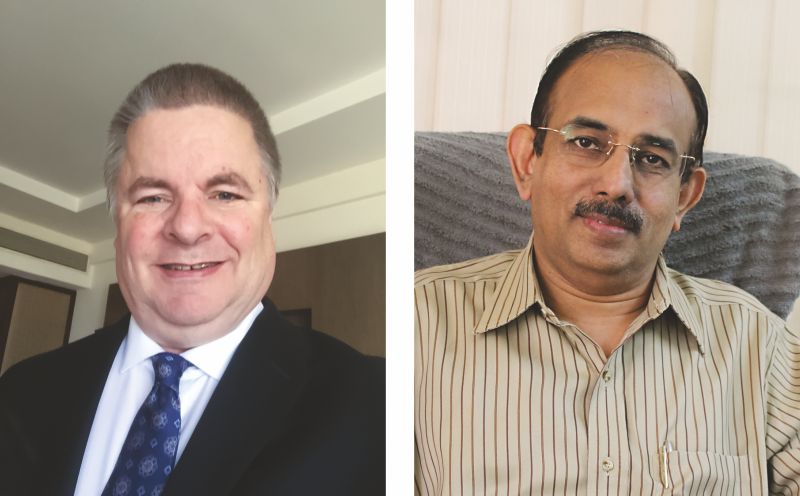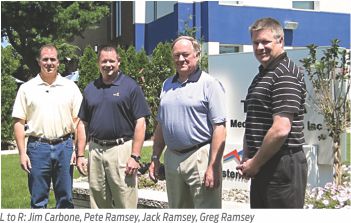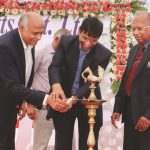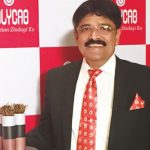Under the stewardship of pioneering Royle Systems Group of USA, its Indian subsidiary is capable of meeting today’s technological demand of the Indian wire and cable industry with many trusted names among the clientele.

Royle Systems Group, LLC RIGHT: Mr. Paulson T. Kunjukunju, MD,
Royle Extrusion Systems Pvt. Ltd.
Royle Extrusion Systems Pvt Ltd. manufactures superior quality cable extrusion systems for the processing of various types of wires. Its product range comprises of the complete dry cure CCV system for MV, HV and EHV cables, Steam cure CV systems for rubber cables, LV cable insulating lines, sheathing lines, extrusion lines for specialty cables, etc.
The company is an Indian subsidiary of the American company M/s Royle Systems Group USA, erstwhile M/s John Royle & Sons USA. Because of this unique association, the Indian subsidiary has acquired all the patented technology and machinery developed by the parent company. WCI recently interacted jointly with Mr. Gregory J. Ramsey, CEO, Royle Systems Group, LLC and Mr. Paulson T. Kunjukunju, Managing Director, Royle Extrusion Systems Pvt. Ltd. to know about the company, its technology, and its activity in the Indian market. Excerpts:
Wire & Cable India: Please tell us about Royle Systems Group.
Gregory J. Ramsey: Royle is an experienced machine designer and equipment manufacturer providing extrusion solutions for wire and cable, as well as rubber processors. We have a lot of history which has spanned generations of my family, but we like to focus on the present and our relationships with our customers.
Paulson T. Kunjukunju: In India, Royle Extrusion Systems Pvt. Ltd. is recognized in the market for dealing in an array of highly advanced Cable Extrusion Systems. The company is an Indian subsidiary of the American company, M/s Royle Systems Group USA. Because of this unique association, we have acquired all the patented technology and machinery developed by the parent company, which enables, us to manufacture superior quality extrusion systems for making cable. The company is also known among peers as well as in the market for its achievement of manufacturing the first indigenous dry cure CCV system.
 WCI: Please tell us the landmarks in the journey of Royle USA.
WCI: Please tell us the landmarks in the journey of Royle USA.
GJR: Royle was founded in 1855 in Paterson, New Jersey, USA, by John Royle and his two sons, John and Vernon, which was the basis for the original company name, John Royle & Sons. The company thrived on the capabilities of John, the machinist, and Vernon, the engineer. Royle developed the screw type extruding machine, which was patented in 1885. The extruder line of products was first developed for the rubber industry as the automobile industry grew, and then expanded to serve the wire and cable industry as the demand for electricity and telephones grew. Royle still serves the rubber and wire and cable industries with its primary products.
In 1939, the Royle family sold the business to the Ramsey family. The Ramsey family is still the majority owner of Royle today with the 4th generation of the Ramsey family managing the business. Royle has moved several times over the years within New Jersey to accommodate increasing demand for its products
Royle has been a global leader in the industry, with exports accounting for over 50 percent of our sales revenue for several decades. In 1992, Royle established a joint venture company in India, Royle Extrusion Systems Ltd, which is located in Pune, Maharashtra, India. In 1999, Royle purchased the shares of the joint venture partner, so Royle Extrusion Systems Ltd is now a 100 percent owned subsidiary of Royle Systems. In 2009, Royle built modern new facilities in Pune, India, which is fully supported by Royle’s design and business team in the United States.
WCI: How was the joint venture formed in India?
PTK: The joint venture was between Finolex Group and Royle USA. Finolex had 49 percent stake in the ownership while Royle, USA had 51 percent. Finolex being a cable manufacturing company, it wouldn’t be easy selling the product to the competitors and it soon became evident that the joint venture cannot continue. Realizing this, Finolex and Royle parted ways, giving 100 percent ownership to Royle, USA.
WCI: Tell us more about the evolution of the Indian subsidiary.
PTK: The Indian subsidiary was primarily formed for manufacturing the thermoplastic extruders as jelly filled telephone cables were used to be the main and major volume in 1990s. However, other cabling technologies like PVC cable extruders, sioplas triple extrusion line, CV lines for LV/MV, etc. followed and technologies were transferred to the Indian subsidiary, which soon absorbed them fully in order to make highly efficient cable making solutions on the Indian soil.
WCI: What kind of product portfolio you have globally and out of that which products do you manufacture here in India?
GJR: Royle is a world-renowned manufacturer of rugged, high performance extruders and extrusion lines that serve a variety of applications and markets within the wire and cable industry as well as rubber industry. One of Royle’s core competencies is the design and configuration of complete extrusion systems. To say briefly, our product portfolio comprises steam CV lines, Drycure CV lines, insulating and sheathing lines, high temperature fluoropolymer systems, fiberoptic cable lines, autoLine controls, extruders, wire line components, etc.
In addition to complete systems, we offer a wide range of plastic and rubber extruders and a full range of wire line components, including extruders, autoLine controls, wire line components, payoffs, take-ups, and accumulators, capstans, CV tubes and accessories, and cooling systems. We also supply a lot of extruders specifically for Silicone applications both in cable and other industries.
PTK: In fact, the product portfolio for Royle USA and Royle India are same now. There is no limitation in transferring the technology. Apart from the PVC extrusion lines for power cables, we have lines for house wiring cables, ABC cables and sheathing lines. The product range also includes coaxial cables lines, triple extrusion sioplas lines, drycure CCV lines, rubber extrusion lines, specialty cable lines etc.
WCI: Who all are your clients in India? Also, tell us about the prestigious projects you have done in India.
PTK: To one of the large cable companies in India, we have supplied altogether four CCV lines, one of which is completely from Indian operation. In other lines, they have procured some components from other sources but the core of the lines like extruders and controls are from us. The first line was for cables up to 132 KV; the next one was for 33 KV; and, the latter two lines were for up to 66 KV. That’s the major project. Our clientele includes most of the major cable manufacturing companies in India.
WCI: With regards to exports out of India, which region are you primarily catering to?
PTK: We are catering to the African countries and the Middle-East. These are the main markets. We also export to the Asian countries. We are supplying lines to Pakistan and Bangladesh too.
WCI: Being a US subsidiary, what kind of parallel strengths do you have? Tell us some unique characteristics of your machines that facilitate the production of long-term reliable wires and cables.
GJR: Rugged construction has always been a characteristic that allows customers to depend on Royle machines that are often in use for more than 50 years. This combined with innovative design features and the latest computerized controls provides our customers with excellent value and ROI. We have insisted that RES build their equipment with the same features and quality customers expect from Royle.
PTK: The heart of the whole extrusion system is actually the extruder. The design of the screw is again the key to the performance of the extruder. Royle’s long experience for many decades really helped to develop screws which are very efficient in performance. That has helped us. Moreover, the Americans always have an outlook that whatever they make should be of long life and perfect. That way they make robust machines. There are actually machines from the 1920s and ’30s still in operation in various places. Of course, Royle is able to provide upgrades to these machines, as well as spare parts.
WCI: Brief us on the R&D and innovation culture at Royle Extrusion Group. What kind of further development or R&D, Royle group would be doing?
GJR: Royle R&D and innovation culture is demonstrated throughout history by the development and patent of the extruder in 1885, the development of the steam CV in 1940, the development of the catenary CV in 1958, the development of the Drycure CV in 1965, the development of freeFoam fluorocarbon extrusion in the 1980s, the development of fiberoptic equipment in the 1990s and the establishment of a 100% owned, state of the art manufacturing company in India in the 2000s. Today, we continue to develop equipment to improve efficiencies for our customers to bring down their cost to manufacture their product.
PTK: As for further developments, we will develop the major areas in which there are possibilities to improve the controls. There are modern means available to control the machines and improve performance. That is one area where we are concentrating. Another thing is the new materials that are coming in the market. We will focus on the processing of those materials with an efficient method. We have recently developed Electrostatic Powder Applicator, which is the first indigenous equipment of this kind. This is widely used in manufacturing of multicore cables. These are the major areas we are concentrating now.
WCI: Tell us about the manufacturing capabilities of your factory here in India.
PTK: We have a shed of 15 meters by 90 meters. So, we have the capability to assemble the complete line; and then we have 15-tonne crane, which is sufficient to handle any machine we manufacture. Basically, our philosophy is that we develop vendors for manufacturing specific parts of machines. We develop them in such a way that they know the precise method to manufacture those parts with good quality control. Although we do fabricate in house, we don’t need to manufacture all of the components which gives us an advantage. The capacity being the big limitation, we don’t have to develop each component in-house.
WCI: Please share with us some recent revenue statistics. Do you import any critical component or it is 100 percent indigenously done?
PTK: As a privately held company, we don’t divulge our turnover. However, we successfully shipped many complete systems, both domestically and overseas, as well as dozens of extruders and computerized control systems. As for import of critical components, it depends on the line. We do import certain components like specialty crossheads, which we import from different sources, or specialty barrels and screws for fluoropolymer (aviation type wire). However, the manual center crossheads we manufacture ourselves, as well as the vast majority of our products.
WCI: What are your views on the Indian wire and cable sector?
GJR: Royle believes in India, both the people and the opportunity in the market. Royle’s views on the India wire and cable industry are best expressed by our 100% ownership of RES and our investment in a new facility in Pune to serve the India market with innovative equipment.
PTK: The Indian wire and cable industry is steadily growing. The main reason is the per capita consumption of electricity compared to the world is very less in India. In order to have proper economic growth, it will continue to grow. Therefore, the potential is there. There is also a good potential in the building wire sector along with specialty cables, especially in the solar cables. Rubber cables also seems to be growing.





